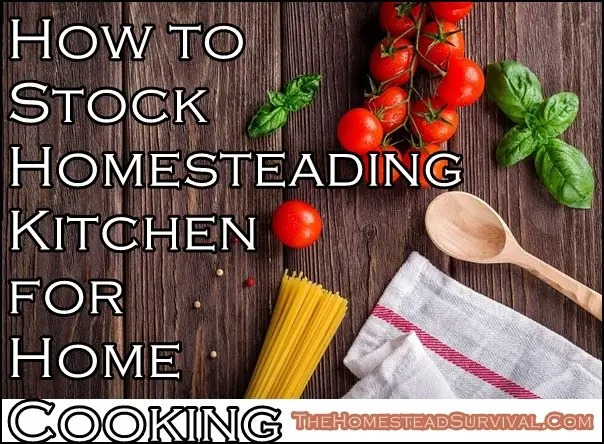How to Stock Homesteading Kitchen for Home Cooking can sometimes be a challenge in this world of processed foods. Homesteading (home cooking) can help everyone get back to the land by growing fruits, vegetables, grains and nuts on your own land but if it is not possible – you can still stock healthy options. Let us take a look at the list.

Food is the most important ingredient for survival. Not everyone takes an interest in cooking, but if you are interested in keeping your life safe out of processed foods and want to save some extra bucks, then learn this art. There are a few cheat ingredients in your kitchen that can make your cooking experience adorable.
The taste buds of all individuals differ significantly and so would be their requirements for cooking. An ideal kitchen will have everything from a loaf of bread, biscuits, to flour, a casserole or any other ingredient, that will help in the prevention of frequent trips to the store. The book “The Pantry Primer” indicates some very vital ingredients that can be stored in bulk and has the ability to create delicious food.
1) For Baking Purpose- If you are more into bakery items, store baking soda, yeast, cocoa, baking powder and non-fat dry milk in your pantry.
2) Oils- Fats are an essential component of our body and the requirement gets fulfilled with the use of different types of fat in your daily diet. Get olive oil, coconut oil, butter, shortening and locally produced Lard for your kitchen.
3) Sweet Tooth- From tea to cake, we need sweeteners to glorify our taste buds. Keep white sugar, brown sugar, turbinado sugar, locally produced honey, molasses, confectioner’s sugar, maple syrup to create exotic dishes for your household.
4) Extras- There are few other things that undoubtedly can’t be avoided as part of your cooking essentials. These include salt, black pepper, apple cider vinegar, balsamic vinegar, spices and herbs, lemon juice and cornstarch.
Here is a shopping list for bare-bones kitchen essentials. If you have these on hand, you should be well-prepared to produce many dishes, and your food shopping should be reduced to buying perishables, including meats and cheeses and fruits and such. Plus, you will discover before long how much tastier home prepared food is.
~
Herbs and spices:
tarragon, bay leaves, cayenne pepper, crushed red pepper, cumin, ground coriander, oregano, paprika, rosemary, thyme leaves, cinnamon, cloves, allspice, ginger, nutmeg, Basil,
Cayenne pepper, Cinnamon, Garlic, Sage
Spice blends: chili powder, curry powder, Italian seasoning, Kosher salt, Black peppercorns pepper
Vanilla extract
~
Oils, Stocks, Condiments:
Beef stock
Chicken stock
Vegetable stock
Pho stock
Lemon juice
Mustard
Olive oil
Parmesan cheese
Red wine
Sherry
Soy sauce
Tomato paste
Vegetable oil
Vinegar
White wine
Malt Vinegar
Balsamic Vinegar
Apple Cider Vinegar
Rice Vinegar
extra-virgin olive oil
Ketchup
Mayonnaise
Dijon mustard
Chili paste
Hot sauce
Worcestershire
~
Canned Goods and Bottled Items:
Canned beans: black, cannellini, chickpeas, kidney
Olives
Peanut butter
Jams and/or jellies
Canned tomatoes – canned and paste
Salsa
Tuna fish
~
Grains and Legumes:
Breadcrumbs: regular, panko
Couscous
Dried lentils
Pasta: regular, whole wheat
Rice
Rolled oats
One other dried grain: try barley, millet, quinoa or wheatberries
~
Baking Products:
Baking powder
Baking soda
Brown sugar
Corn meal
Corn starch
Vanilla
White sugar
Yeast
All-purpose flour
Masa harina – Corn Tortillas
Honey
~
Refrigerator Basics:
Butter
Cheese: sharp cheddar, feta, Parmesan, mozzarella
Large eggs
Milk
Plain yogurt
~
Freezer Basics:
Frozen fruit: blackberries, blueberries, peaches, strawberries
Frozen vegetables: broccoli, bell pepper and onion mix, corn, edamame, peas, spinach
Garden Produce:
Garlic
Onions (red, yellow)
Potatoes
Lettuce
Radishes
Tomatoes
Cucumber
Dried fruit: raisins, apples, pineapple
Nuts or seeds: almonds, peanuts, sunflower and pumpkin
Click here to read about:
http://makingthymeforhealth.com/stock-healthy-pantry/

